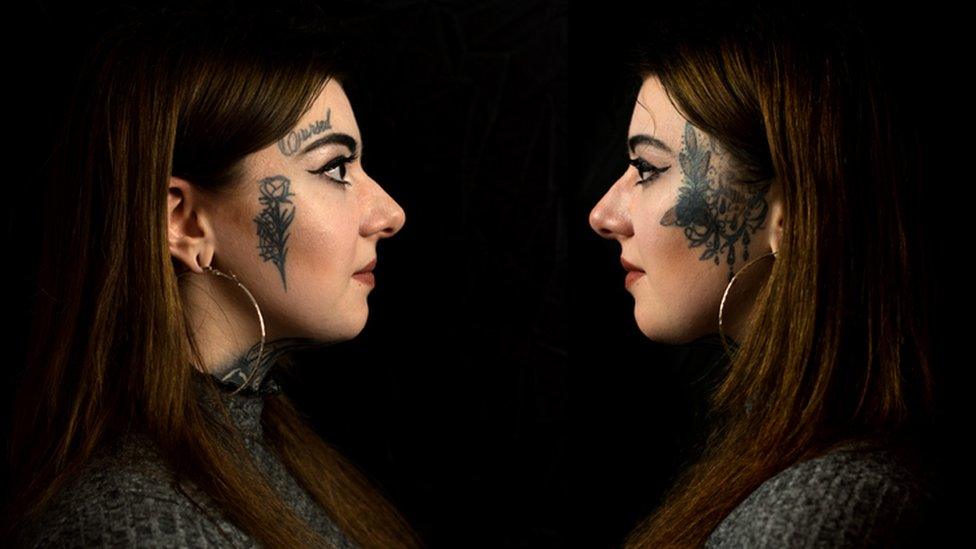'I was refused a tattoo because I am HIV positive'
- Published

Deejay Bullock was refused a tattoo at studio in Dundee in July
Deejay Bullock says he was "absolutely devastated" to be refused a tattoo because he is HIV positive.
The 38-year-old, who was diagnosed a decade ago, said he was shocked to be turned away because there had been no problems with his previous tattoos.
HIV groups say Deejay should not have been refused and are publishing new guidelines aimed at stopping people with HIV being discriminated against.
They say refusing an HIV positive person is illegal under equality laws.
Tattooists should not even ask clients about their HIV status, the organisations said.

Deejay, who lives in Aberdeen, already has four tattoos
Deejay, who lives in Aberdeen, has been living with HIV since 2006 but was not diagnosed until 2009.
He told BBC Scotland he struggled with his status at first and his mental health declined rapidly.
For his first two tattoos, which he had soon after his diagnosis, he did not disclose his HIV for fear of being rejected.
Since 2012, Deejay has worked in LGBT health, which he said had boosted his confidence and helped him to come to terms with his status.
More recently, he has had two tattoos in Aberdeen at which he declared on the form that he was HIV positive.

Deejay says he declared his HIV positive status for his previous two tattoos
"It was absolutely fine. There were no questions," he said. "It was never even discussed."
In July this year, Deejay decided to get a tattoo for his birthday.
He found a tattooist in Dundee who could fit him in and went along and filled out a form.
"I handed it back to him and he looked and said 'are you joking?'."
The tattooist told Deejay: "I'm not putting myself or my colleagues or anyone else at risk."
For Deejay, the rejection took him back to the stigma and hurt of the early days of diagnosis.
He said the tattooist turned him away through fear and ignorance.
Safety procedures
HIV Scotland, alongside other HIV/Aids groups, has published a statement saying that the virus does not present a barrier to tattooing, piercing and cosmetic or beauty treatments.
Its guidelines say that refusing people living with HIV a tattoo or piercing is illegal under the Equality Act 2010.
It also says that asking clients if they are HIV positive is unjustified according to current data protection legislation.
The HIV organisations said that standard safety procedures meant tattooists and clients would be protected from blood-borne viruses.
These include sterilising equipment, using fresh disposable gloves and new ink for each client.
It is estimated that 5,881 individuals are living with HIV in Scotland.
Earlier this year, Public Health Minister Joe Fitzpatrick said people should not be turned away from tattoo studios because they were HIV positive.
He said: "This should not be happening in Scotland and I think we need to raise awareness, and as part of that tackle stigma."
A Scottish government spokeswoman said it welcomed the British HIV Association statement.
She said: "There is no place for HIV stigma in today's Scotland, and a diagnosis of HIV should not represent a barrier to living a full and enjoyable life."
- Published8 March 2019
